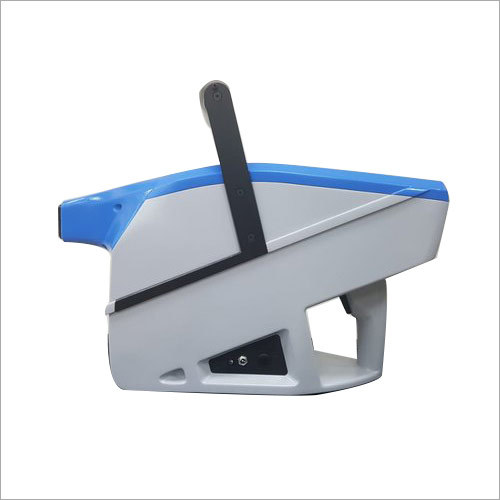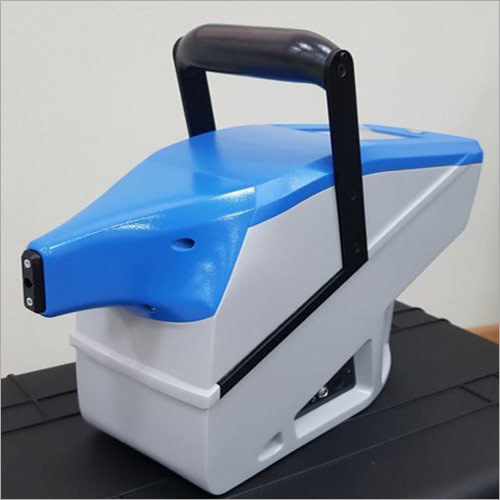Portable Laser Spectrometer PMI Machine
10000 INR/Unit
Product Details:
- Power Supply Battery
- Application Industrial
- Material Metal
- Product Type Portable Laser Spectrometer PMI Machine
- Color Blue
- Click to View more
X
Portable Laser Spectrometer PMI Machine Price And Quantity
- 1 Unit
- 10000 INR/Unit
Portable Laser Spectrometer PMI Machine Product Specifications
- Portable Laser Spectrometer PMI Machine
- Blue
- Battery
- Industrial
- Metal
Portable Laser Spectrometer PMI Machine Trade Information
- 100 Unit Per Week
- 1 Week
Product Description
A portable laser spectrometer PMI machine is an analytical instrument used to measure the properties of light emitted, absorbed, or scattered by molecules or materials. It operates based on the principles of spectroscopy, which involves the interaction of light with matter to provide information about the composition, structure, and properties of the material being analyzed.
Here's a brief overview of how a laser spectrometer works:
1. Light Source: Laser spectrometers use lasers as their light source. Lasers emit intense, monochromatic (single wavelength) light that can be precisely controlled.
2. Sample Interaction: The laser beam is directed onto the sample being analyzed. The interaction between the laser light and the sample depends on various factors such as the composition, structure, and physical state of the sample.
3. Detection: After interacting with the sample, the light is collected and analyzed. This can involve measuring changes in the intensity, wavelength, polarization, or phase of the light. Various detection techniques such as absorption spectroscopy, fluorescence spectroscopy, Raman spectroscopy, or scattering spectroscopy can be employed depending on the specific application and desired information.
4. Data Analysis: The collected data is then processed and analyzed to extract information about the sample. This may involve comparing the observed spectral features with known reference spectra or using mathematical algorithms to interpret the data.
Portable Laser Spectrometer PMI Machine Specifications:
1. Laser Emitter Safety Class: 3b
2. Features: Carbon analysis directly in air, no argon gas required
3. Model Name/Number: LIS 01
4. Portable: Yes
Portable Laser Spectrometer PMI Machine Applications:
1. Chemical Analysis: Laser spectrometers are extensively used in chemical analysis for identifying and quantifying the presence of various chemical compounds in samples. This includes applications in environmental monitoring, forensic science, pharmaceuticals, and food safety.
2. Environmental Monitoring: Laser spectrometers are used to analyze air and water quality, detect pollutants, monitor greenhouse gas emissions, and study atmospheric chemistry. They play a crucial role in understanding and mitigating environmental pollution and climate change.
3. Medical Diagnostics: In medicine, laser spectrometers are utilized for diagnostic purposes such as detecting biomarkers in biological fluids, analyzing tissue samples for disease diagnosis, and monitoring drug concentrations in the body. Techniques like Raman spectroscopy and infrared spectroscopy are particularly valuable in medical applications.
4. Materials Characterization: Laser spectrometers are employed to characterize the composition, structure, and properties of materials in fields such as metallurgy, semiconductors, polymers, and nanotechnology. They provide valuable insights for research and development, quality control, and process optimization in material science and engineering.
5. Astrophysics and Astronomy: Laser spectrometers are used in astronomical observations to analyze the composition and properties of celestial objects such as stars, planets, comets, and interstellar gas clouds. They help scientists understand the chemical makeup of the universe and the processes occurring in space.
6. Biological and Life Sciences: Laser spectrometers are applied in biological and life sciences for studying biomolecules, cellular structures, and biological processes. They are used in areas such as DNA sequencing, protein analysis, cell imaging, and drug discovery.
7. Security and Defense: Laser spectrometers have security and defense applications including explosive detection, chemical warfare agent detection, and monitoring of hazardous substances in the environment. They are employed in portable and remote sensing systems for rapid identification of threats.
8. Industrial Process Monitoring: Laser spectrometers are utilized in industrial settings for process monitoring, quality control, and optimization of manufacturing processes. They enable real-time analysis of chemical compositions, reaction kinetics, and product characteristics, leading to improved efficiency and product quality.
Portable Laser Spectrometer PMI Machine FAQ:
Q. What is a laser spectrometer?
Ans: A laser spectrometer is an analytical instrument that uses laser light to analyze the properties of materials through spectroscopic techniques. It measures the interaction of laser light with molecules to provide information about their composition, structure, and properties.
Q. How does a laser spectrometer work?
Ans: Laser spectrometers operate based on spectroscopic principles, involving the interaction of laser light with the sample being analyzed. The light interacts with the sample, and changes in its properties (e.g., absorption, emission, scattering) are measured to deduce information about the sample's composition and characteristics.
Q. What types of spectroscopic techniques are used in laser spectrometers?
Ans: Laser spectrometers employ various spectroscopic techniques such as absorption spectroscopy, fluorescence spectroscopy, Raman spectroscopy, and scattering spectroscopy. Each technique provides different insights into the sample's properties and is chosen based on the specific application requirements.
Q. What are the applications of laser spectrometers?
Ans: Laser spectrometers have diverse applications across fields such as chemistry, biology, environmental science, medicine, materials science, and industry. They are used for chemical analysis, environmental monitoring, medical diagnostics, materials characterization, astrophysics, security, and industrial process monitoring, among others.
Q. What are the advantages of laser spectrometers?
Ans: Laser spectrometers offer several advantages including high sensitivity, specificity, accuracy, precision, and the ability to provide real-time measurements. They can analyze a wide range of samples, require minimal sample preparation, and are suitable for both qualitative and quantitative analysis.
Q. What are some common laser sources used in laser spectrometers?
Ans: Common laser sources used in laser spectrometers include diode lasers, solid-state lasers (e.g., Nd:YAG, Ti:sapphire), semiconductor lasers, gas lasers (e.g., helium-neon), and fiber lasers. The choice of laser source depends on factors such as wavelength, power, coherence, and spectral characteristics required for the specific application.
Q. What are the key components of a laser spectrometer?
Ans: Key components of a laser spectrometer include the laser source, optical components (e.g., lenses, mirrors, filters), sample chamber or cuvette, detector(s), data acquisition system, and data analysis software. These components work together to generate, manipulate, and analyze the laser light and its interaction with the sample.
Q. How are laser spectrometers calibrated?
Ans: Laser spectrometers are calibrated using known reference samples or standards to establish the relationship between the measured signal and the sample properties of interest (e.g., concentration, absorbance). Calibration curves or mathematical models are then used to quantitatively analyze unknown samples based on the calibration data.
Q. Are laser spectrometers suitable for field or portable applications?
Ans: Yes, laser spectrometers can be adapted for field or portable applications by miniaturizing the instrument, optimizing power consumption, and incorporating ruggedized designs. Portable laser spectrometers are used for on-site analysis in environmental monitoring, industrial inspections, security screening, and medical diagnostics.
Q. What are the limitations of laser spectrometers?
Ans: Some limitations of laser spectrometers include the need for careful calibration, sensitivity to environmental conditions (e.g., temperature, humidity), potential interference from background signals, and constraints on sample compatibility (e.g., transparency, size, state). Additionally, certain spectroscopic techniques may require specialized equipment or expertise.
Tell us about your requirement

Price:
Quantity
Select Unit
- 50
- 100
- 200
- 250
- 500
- 1000+
Additional detail
Mobile number
Email
 English
English Spanish
Spanish French
French German
German Italian
Italian Chinese (Simplified)
Chinese (Simplified) Japanese
Japanese Korean
Korean Arabic
Arabic Portuguese
Portuguese




 Call Me Free
Call Me Free
